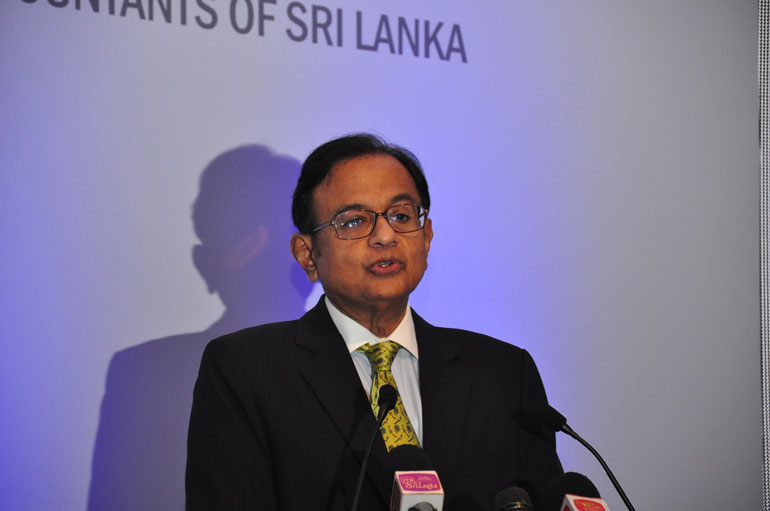Friday Feb 20, 2026
Friday Feb 20, 2026
Saturday, 24 October 2015 00:05 - - {{hitsCtrl.values.hits}}

India's former Minister of Finance and Home Affairs P. Chidambaram delivering the keynote address
By Waruni Paranagamage
India’s former Minister of Finance and Home Affairs P. Chidambaram on Thursday said that Sri Lanka’s tax to GDP ratio, which has been on the decline since 1990 and is currently at a low of 15%, should be increased to address the country’s budget deficit.
Delivering his keynote speech on the topic of ‘The Challenge of Tax Policy and Tax Administration in a Developing Country’ at 20th Annual Oration on Taxation - organised by the Faculty of Taxation of the Institute of Charted Accountants of Sri Lanka (CA Sri Lanka) in Colombo - Chidambaram said that Sri Lanka should be concerned by the decline of its tax to GDP ratio since 1990.
“I am informed that the tax to GDP ratio of Sri Lanka is about 16% and the worry is that it has been declining since 1990. During this period, in most years, actual revenue collections were lower than the budget estimates,” he added.
Describing the reasons for Sri Lanka’s poor tax revenue, he said the heavy taxes on goods and services would not be fruitful in increasing revenue as people consume a small quantity of goods and services due to the fact that they have neither sufficient wealth nor income.
He asserted that flawed tax policies and tax collection practices, the negative impact of external and internal economic crises on the economy, corruption, poor tax base policies and poor tax collection practices were the other issues linked with low tax revenue.
The former minister proposed that advanced, broad-based tax administration practices, policy reforms and upgrading knowledge of the tax system would create an appropriate and productive tax system in Sri Lanka.
“Tax policies have to be country-specific and autonomous, and it would not be wise to copy or imitate the tax policies of another country. The only precept a country can follow is that some policies have failed and some have succeeded elsewhere. To the extent that a country is willing to learn from others’ failures and successes, it may be useful to study those policies,” he added.
Chidambaram further highlighted that the tax incentives and concessions for the investors would damage the tax base of the country and the Government should focus on the real needs of investors such as infrastructure development, education and security in order to attract investment to the country.
“Sri Lanka has signed 24 such treatie,s beginning with the first treaty in 1980. The effectiveness of offering tax incentives to promote investment, in particular tax holidays and tax-free zones, would damage a developing country’s tax base. The real drivers of investment are infrastructure, education and security,” he added.
However, he described that the tax base was the most important thing in a country to boost the revenue collection.
“The simple and clearly-worded tax laws, moderate rates of taxes, low compliance costs, a non-adversarial tax administration and a fair and impartial dispute resolution mechanism will enlarge the tax base and boost revenue collection,” Chidambaram added.